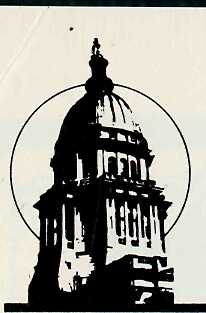 |
Home | Search | Browse | About IPO | Staff | Links |
 |
Home | Search | Browse | About IPO | Staff | Links |
 The State of the State
The State of the StateBy DIANE ROSS
Thompson's BIG JIM finally got the billion-dollar road program he wanted so badly. But he had to buy off Jane Byrne — and sell out suburban Republicans — to get it. Basically, the package cost Illinois only about $600 million in borrowing power. But it may have cost Thompson the support of suburban Republicans, the single most powerful minority in the General Assembly. And it's the suburban Republicans who will decide whether the road program becomes a milestone for Thompson or a millstone. It's easy to see why Thompson went after a road program. Roads are certainly a legitimate economic issue. Politically, roads are sometimes the only pork barrel downstate legislators can roll home at the end of the session. Governors eventually must meet the demands of downstate legislators because they hold the balance of power in the General Assembly. Suburban Republicans But one issue does not a record make. For that, Thompson needs the backing, or at least the cooperation of the General Assembly. And Thompson, who must work with a legislature controlled by Democrats, increasingly depends on the most powerful minority, the suburban Republicans. It may be that public satisfaction with Thompson's road program will soothe the ire of suburban Republicans. In the short run, he needs them now more than ever. The Democrats, once cautious because of their nominal one-vote edge in the House, now seem to have the legislative ship firmly under control. They may have floundered a bit after Daley's death; they may have been forced to tread water after Byrne's election, but apparently they have consolidated their power again. Democrats did more than just deliver the road program. They succeeded in pulling off the oldest trick in the political book: they called the shots, and they'll get whatever credit is due but little of whatever blame accrues. Thompson also fought for the plan, but if it backfires, he'll get the blame. And, by forcing the suburbs to pay for a big share of the city's mass transit package, the Democrats have neatly divided the Republicans: the suburbs against down-state. Senator Daley But it's the individual Democratic leaders whom Thompson should worry about the most, especially Sen. Richard M. Daley, who's been content to stay in the background until now. Daley, who might be looking a little further up the political ladder than Chicago's city hall, has studied with the best. Since the death of his father, he has supported two major issues, and he has carried through on both of them: mental health advocacy and nursing home reform. These are solid social issues with strong statewide interest. Daley also is steering the Democrats' move to override Thompson's veto of their bill to ban the sales tax on food and medicine. If the override succeeds, Daley will get the credit. Voters are sure to remember the road program and the sales tax ban when they go to the polls a year from now. In the long run also, Thompson needs the suburban Republicans — and they need him. The suburbs are the ace the Republicans have been holding since the last reapportionment when it became clear the population was shifting fron Cook to the collar counties. Republicans stand to gain legislative and congressional seats at the expense of the Democrats in the 1981 reapportionment. It must be remembered that the legislature elected next year will be the one to tackle reapportionment. Republicans need all the seats they can get and Thompson isn't helping them. Rep. Cal Skinner (R., Crystal Lake) put it well when he said that through the road program, Thompson and Republican legislative leaders gave the legislature to the Democrats for the next 10 years. Democrats have already forced Thompson to take the blame if they fail to override his veto of the sales tax ban on food and medicine. They have everything to gain and nothing to lose by forcing the override. And if they win, they'll get the credit for cutting taxes, and the revenue lost to the state for the billion-dollar road budget will be Thompson's problem. Why then did Thompson apparently sell out the suburban Republicans? The answer may lie in the divide-and-conquer strategy Thompson used to negotiate the road deal. Thompson, who has been accused of being a candidate who campaigns for himself first and his party later, has had his problems with the General Assembly. Many legislators like the way he doesn't interfere, but more of them loathe his habit of dropping major legislation into the hopper at the last minute (Class X) or waiting until a bill reaches his desk and then doing some legislating himself via the amendatory veto. Thompson, in dividing and conquering to pass his road program, may have given the General Assembly grounds for revolt. Dealing with the legislature is Thompson's biggest problem now. Apparently it's not going to go away The General Assembly has met in Springfield for every one of the last 12 months, and it's likely to be here for the next nine months as well, beginning with the veto session which opens October 3. 2/ October 1979/ Illinois Issues |
|
|